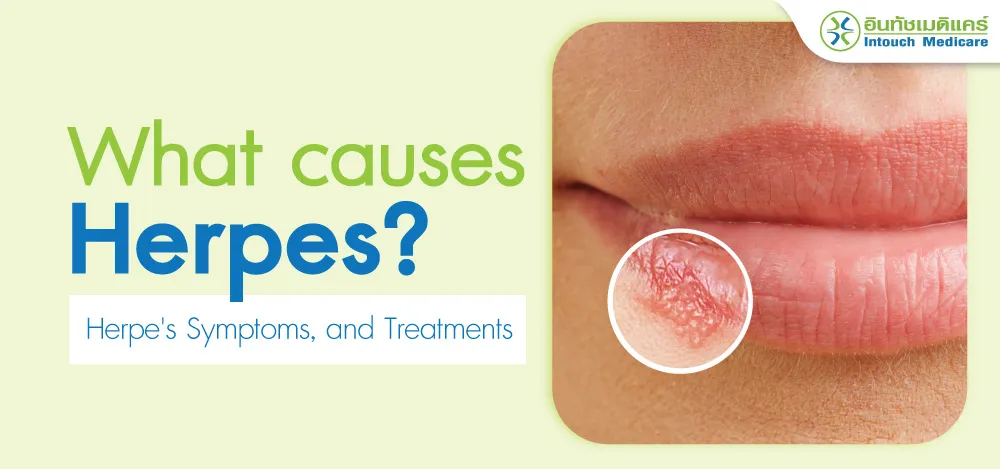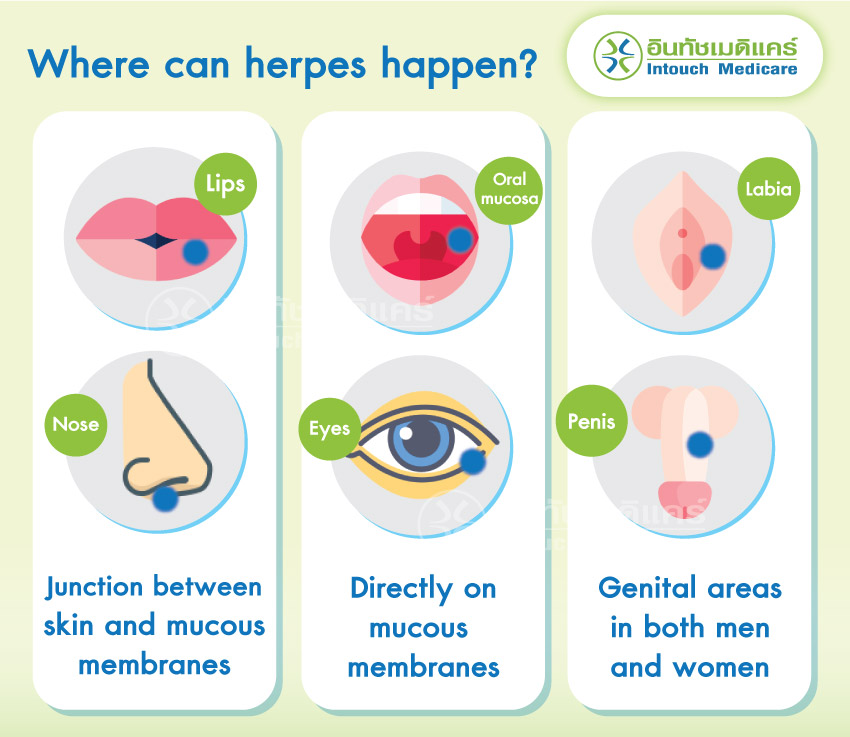Herpes: Causes, Symptoms, and Treatments

Herpes is a sexually transmitted disease caused by a virus that can be easily passed from one person to another. Once someone contracts herpes, it's challenging to completely eradicate it because the virus remains dormant in the body, often reoccurring. The virus hides in nerve cells and can evade the immune system for years.
Important facts about herpes:
What causes herpes?
Herpes (Genital herpes) is a skin-to-skin and sexually transmitted infection caused by the herpes simplex virus. This virus can enter the body through mucous membranes, such as those found in the genitals, mouth, or eyes, or through small breaks in the skin. The incubation period typically ranges from 3 to 7 days.

Where can herpes happen?
Herpes can appear at the area between the skin and mucous membranes, such as on the lips, inside the mouth, and around the nostrils.
Herpes can also directly affect mucous membranes, such as the lining of the mouth, conjunctiva of the eyes, cornea, vagina, anus, and the areas around the anus, as well as the tip or nearby regions of the penis.
Genital herpes can affect both men and women. In men, it may appear on the outer surface of the shaft or head of the penis. In women, it can occur on the labia majora and labia minora, with women often experiencing more frequent and severe symptoms, including a burning sensation.
How many types of herpes?
There are two types of herpes:
HSV-1 commonly causes herpes around the mouth and on the skin above the navel. It can be found in both children and adults. This type of virus is not typically transmitted through sexual contact but rather through direct contact. However, with the increase in oral sex, HSV-1 can also cause genital herpes.
HSV-2 commonly causes herpes in the genital area and is primarily transmitted through sexual contact.Oral Herpes
Oral herpes is an infection that occurs around the mouth, lips, and surrounding facial areas. It is more commonly seen than other types of herpes infections. The initial infection is mostly seen in young children between the ages of 1-4, with adult infections being less common. Most cases are caused by HSV-1.

Genital Herpes in Women
Genital herpes in women tends to be more severe than in men due to the moist environment of the genital area. Herpes sores do not only appear on the external genitalia but are often accompanied by swelling and may spread into the vagina, reaching the cervix. This can potentially lead to cervical cancer in the future.

Genital Herpes in Men
Genital herpes in men typically appears as clusters of small blisters, usually numbering around 5-10, located on the edge of the foreskin. In some cases, these blisters can spread along the entire length of the penis. If the infection becomes severe, it may extend into the urethra, causing ulcers, urethritis, painful urination, and a burning sensation. There may be a slight discharge of pus, or in some cases, no discharge at all.


Symptoms of herpes
The initial symptoms of herpes often include a burning or tingling sensation in the area where the infection has occurred. The symptoms are similar whether the infection is in the mouth or genital area, but they appear in different locations. The symptoms can be divided into three stages: primary infection, asymptomatic phase, and recurrent phase.

Primary infection phrase
For those who have never had herpes before, the initial symptoms are usually severe and last for a longer period. Symptoms typically start with irritation, burning sensations, red patches on the skin, and the rapid development of small red blisters that eventually turn into pustules. Once these blisters burst, they can cause significant pain and discomfort.
Patients may also experience general malaise, low-grade fever, and in some cases, neurological symptoms such as leg pain, difficulty urinating, and numbness in certain areas. The lesions typically last for about 2-3 weeks before healing.
Asymptomatic phase
During this phase, the virus remains in the body without causing any noticeable symptoms, known as the latent phase. Although the virus is not actively causing visible infection, it can still replicate and be transmitted, particularly in the genital area, even in the absence of visible sores.
Recurrent phrase
It can typically less severe and involve fewer areas compared to the initial infection. Symptoms are generally milder, and fever is less common. Recurrent outbreaks often occur near the site of the original infection, especially in the genital area, and may happen more frequently.
Treatments of herpes
Doctors may prescribe oral medications to reduce the severity, frequency, and duration of herpes outbreaks. These medications are typically given at the onset of symptoms, such as burning or tingling, before sores appear. They may also be used to prevent recurrent outbreaks in those who experience frequent episodes or have underlying health conditions
Antiviral Medications can help speed up the healing of herpes sores, alleviate pain, and reduce itching or burning sensations.
Medications may be provided to relieve pain and reduce fever.
Additional treatments may be customized to the person by the physician based on specific needs and medical background.

What should you do if you think you have herpes?
Early diagnosis and treatment are beneficial for patients as they help prevent the spread of herpes and reduce symptoms such as discomfort, burning, and pain in the affected areas. For those who have previously had herpes, even minor symptoms should prompt a prompt medical check-up to prevent complications, especially if the immune system is compromised.

Clinic for herpes treatment
Intouch Medicare Clinic offers affordable herpes treatment services. If you have herpes, it's important to visit a doctor for proper diagnosis and treatment, even though there is currently no cure for the virus.
Our clinic specializes in gynecology and sexually transmitted infections, with services provided by experienced and approachable female doctors. Patients need not worry about feeling uncomfortable or embarrassed during their visit.
For information and preliminary cost assessments, you can contact us via our website or call our hotline at 081-562-7722 during clinic hours.
At Intouch Medicare Clinic, we provide comprehensive care for sexually transmitted infections, ensuring your information remains confidential. We offer services for all genders and ages with attentive care. You can make an appointment in advance or walk in at your convenience.
Interesting articles
For more info and make appointment
Hot Line 081-562-7722
Compiled by intouchmedicare Clinic
Last Update : 03/09/2024
Usage Permission: Images may be used without permission strictly for educational or informational purposes, provided that credit is given, or the source is cited as intouchmedicare.com.
